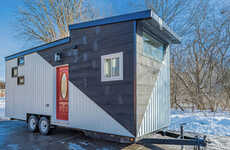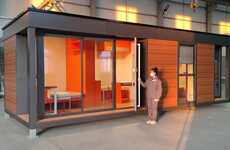
This New Smart Home Apartment's Design Transforms Over Time
Rahul Kalvapalle — April 9, 2016 — Art & Design
There are lots of new smart home projects out there that are pushing housing innovation in a big and productive way, but few projects are as innovative as the Small Home Smart Home developed by Hong Kong-based architects LAAB.
This home is a tiny 29-square space that LAAB has gone ahead and squeezed a whole bunch of features into using innovative and space-saving design. What's so great and unique about this new smart home is that it doesn't merely take into account the standard three dimensions of space, but also takes into account the fourth dimension -- time. The apartment is designed to transform based on the time of day and the pertinent need.
Ultimately, the Small Home Smart Home could inspire a number of other projects that will be of great use in cities like Hong Kong that are ridiculously expensive to live in.
This home is a tiny 29-square space that LAAB has gone ahead and squeezed a whole bunch of features into using innovative and space-saving design. What's so great and unique about this new smart home is that it doesn't merely take into account the standard three dimensions of space, but also takes into account the fourth dimension -- time. The apartment is designed to transform based on the time of day and the pertinent need.
Ultimately, the Small Home Smart Home could inspire a number of other projects that will be of great use in cities like Hong Kong that are ridiculously expensive to live in.
Trend Themes
1. Transformative Design - The Small Home Smart Home demonstrates the potential for homes that can dynamically change their layout and features based on time and need.
2. Space-saving Innovation - LAAB's innovative design showcases how smart homes can maximize functionality and features in compact spaces.
3. Time-based Adaptability - The incorporation of the fourth dimension, time, in the apartment's design highlights the opportunity for smart homes that adjust according to different times of the day.
Industry Implications
1. Architecture - Architects and designers can explore transformative concepts to create adaptable homes that maximize space and functionality.
2. Real Estate - Developers and real estate companies can consider incorporating smart home designs with time-based adaptability as a unique selling point.
3. Urban Planning - City planners can explore the potential of compact smart homes to address housing affordability and optimize living spaces in densely populated areas.
6.9
Score
Popularity
Activity
Freshness























